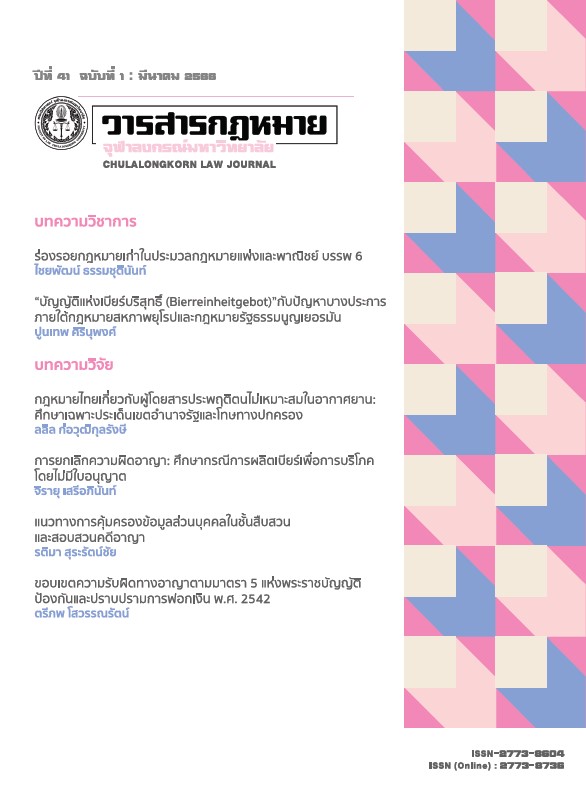การยกเลิกความผิดอาญา: ศึกษากรณีการผลิตเบียร์เพื่อการบริโภคโดยไม่มีใบอนุญาต
Main Article Content
บทคัดย่อ
ถึงแม้ว่ากฎกระทรวงการผลิตสุรา พ.ศ.2565 ซึ่งมีผลบังคับใช้เมื่อวันที่ 2 พฤศจิกายน พ.ศ.2565 อนุญาตให้บุคคลที่มีอายุตั้งแต่ 20 ปีบริบูรณ์ผลิตเบียร์เพื่อการบริโภคได้ แต่การผลิตในลักษณะดังกล่าวยังถูกควบคุมด้วยใบอนุญาตและการจัดเก็บค่าธรรมเนียม โดยหากฝ่าฝืนทำการผลิตโดยไม่มีใบอนุญาตจะต้องระวางโทษจำคุกไม่เกิน 6 เดือน หรือปรับไม่เกิน 1 แสนบาท หรือทั้งจำทั้งปรับ จากการศึกษาพบว่าสาเหตุหลักของการนำใบอนุญาตมาใช้กับการผลิตเบียร์เพื่อการบริโภคเป็นเพราะภาครัฐต้องการที่จะจัดเก็บภาษีให้ได้มากยิ่งขึ้น เมื่อทำการศึกษารูปแบบการควบคุมการผลิตสินค้าที่มีลักษณะใกล้เคียงกัน เช่น ยาสูบ พบว่าการผลิตยาสูบเพื่อการบริโภคไม่ต้องขอใบอนุญาตหรือเสียค่าธรรมเนียมแต่อย่างใด ดังนั้นหากมีการผลิตยาสูบเพื่อการบริโภคโดยไม่มีใบอนุญาตไม่เป็นความผิดอาญา การผลิตเบียร์เพื่อการบริโภคโดยไม่มีใบอนุญาตก็ไม่ควรเป็นความผิดอาญาเช่นกัน เมื่อพิจารณาหลักเกณฑ์ในการกำหนดความผิดอาญาทั้งในประเทศไทยและต่างประเทศพบว่าการผลิตเบียร์เพื่อการบริโภคโดยไม่มีใบอนุญาตไม่สอดคล้องกับหลักเกณฑ์ในการกำหนดความผิดอาญา และเมื่อพิจารณามาตรการที่ใช้บังคับกับการผลิตเบียร์เพื่อการบริโภคในต่างประเทศพบว่าแม้ในอดีตประเทศอังกฤษและประเทศสิงคโปร์เคยนำโทษทางอาญามาใช้กับการผลิตเบียร์เพื่อการบริโภคโดยไม่มีใบอนุญาต แต่ปัจจุบันประเทศดังกล่าวได้ยกเลิกกฎหมายเหล่านั้นแล้วโดยอนุญาตให้ผลิตโดยไม่ต้องขอใบอนุญาต ดังนั้นบทความนี้จึงมีวัตถุประสงค์เพื่อศึกษาแนวทางการนำโทษทางอาญาออกจากการผลิตเบียร์เพื่อการบริโภคโดยไม่มีใบอนุญาต
Article Details

อนุญาตภายใต้เงื่อนไข Creative Commons Attribution-NonCommercial-NoDerivatives 4.0 International License.
ลิขสิทธิ์และเนื้อหาในเว็บไซต์ของวารสารกฎหมาย (รวมถึง โดยไม่จำกัดเฉพาะ เนื้อหา รหัสคอมพิวเตอร์ งานศิลป์ ภาพถ่าย รูปภาพ ดนตรีกรรม โสตทัศนวัสดุ) เป็นกรรมสิทธิ์ของวารสารกฎหมาย และผู้ได้รับการโอนสิทธิทุกราย
1. วารสารกฎหมาย ให้อนุญาตให้คุณใช้สิทธิอันไม่เฉพาะเจาะจงที่สามารถถูกถอนเมื่อใดก็ได้ โดยไม่มีค่าใช้จ่าย ในการ
- เยี่ยมชมเว็บไซต์และเอกสารในเว็บไซต์นี้ จากคอมพิวเตอร์หรือเครื่องมือสื่อสารผ่านเว็บบราวเซอร์
- คัดลอกและจัดเก็บเว็บไซต์และเอกสารในเว็บไซต์นี้บนลงคอมพิวเตอร์ของคุณผ่านระบบความจำ cache
- สั่งพิมพ์เอกสารจากเว็บไซต์นี้สำหรับการใช้ส่วนตัวของคุณ
- ผลงานที่ได้รับการตีพิมพ์โดยวารสารกฎหมาย จุฬาลงกรณ์มหาวิทยาลัย ถูกคุ้มครองภายใต้ Creative Commons Attribution 4.0 International License ซึ่งอนุญาตให้ทุกคนสามารถคัดลอก แจกจ่าย ดัดแปลง ส่งต่อ ผลงานได้ ก็ต่อเมื่อผลงานและแหล่งข้อมูลได้รับการอ้างอิงอย่างเหมาะสม
2. วารสารกฎหมาย จุฬาลงกรณ์มหาวิทยาลัย สงวนสิทธิ์ไม่อนุญาตให้คุณใช้สิทธิอื่นใดที่เกี่ยวข้องกับเว็บไซต์และเอกสารบนเว็บไซต์นี้ เช่น การคัดลอก ดัดแปลง เปลี่ยนแปลง ส่งต่อ ตีพิมพ์ แจกจ่าย เผยแพร่ จัดแสดงในที่สาธารณะ ไม่ว่าจะในรูปแบบใดก็ตาม ซึ่งเว็บไซต์หรือเอกสารบนเว็บไซต์ โดยไม่อ้างอิงถึงแหล่งข้อมูลหรือโดยไม่ได้รับอนุญาตเป็นลายลักษณ์อักษรจากวารสารกฎหมาย จุฬาลงกรณ์มหาวิทยาลัย
3. คุณอาจขออนุญาตที่จะใช้เอกสารอันมีลิขสิทธิ์บนเว็บไซต์นี้โดยการเขียนอีเมลล์มายัง journal@law.chula.ac.th
4. วารสารกฎหมาย จุฬาลงกรณ์มหาวิทยาลัย เข้มงวดกับการคุ้มครองลิขสิทธิ์อย่างมาก หากวารสารกฎหมาย จุฬาลงกรณ์มหาวิทยาลัยพบว่าคุณได้ใช้เอกสารอันมีลิขสิทธิ์บนเว็บไซต์นี้โดยไม่ถูกต้องตามการอนุญาตให้ใช้สิทธิ ดังที่กล่าวไปข้างต้น วารสารกฎหมาย จุฬาลงกรณ์มหาวิทยาลัยอาจดำเนินคดีตามกฎหมายต่อคุณได้ เพื่อเรียกร้องค่าเสียหายที่เป็นตัวเงินและคำขอชั่วคราวให้คุณหยุดการใช้เอกสารดังกล่าว ทั้งนี้ คุณอาจถูกสั่งให้ชดใช้ค่าใช้จ่ายใดๆ ที่เกี่ยวข้องกับการดำเนินการตามกฎหมายนี้
หากคุณพบเห็นการใช้เอกสารอันมีลิขสิทธิ์ของวารสารกฎหมาย จุฬาลงกรณ์มหาวิทยาลัย ที่ขัดหรืออาจขัดต่อการอนุญาตให้ใช้สิทธิดังที่ได้กล่าวไปข้างต้น โดยเชื่อว่าได้ละเมิดลิขสิทธิ์ของคุณหรือของผู้อื่น สามารถร้องเรียนมาได้ที่ journal@law.chula.ac.th
เอกสารอ้างอิง
Cocktailthai. เบียร์มาจากโจ๊กบูด. [ออนไลน์] แหล่งที่มา: https://bit.ly/3HPaUBL [1 สิงหาคม 2564]
SARAKADEE LITE. เบียร์โบราณ จากสวัสดิการแรงงานทาสสู่เครื่องดื่มสำนักบาทหลวง. [ออนไลน์] แหล่งที่มา: https://www.sarakadeelite.com/lite/beer-history/ [8 พฤศจิกายน 2565]
อภิรัตน์ เพชรศิริ. ทฤษฎีอาญา ทฤษฎีโทษและกระบวนการขั้นพื้นฐาน. พิมพ์ครั้งที่ 4. กรุงเทพมหานคร: วิญญูชน, 2562.
Herbert L Packer. The Limits of the Criminal Sanction. California: Stanford University, 1968.
ณัฐฐวัฒน์ สุทธิโยธิน. กฎหมายอาญาและอาชญาวิทยาขั้นสูง. กรุงเทพมหานคร: คณะนิติศาสตร์ มหาวิทยาลัยสุโขทัยธรรมาธิราช, 2555.
ดิศรณ์ ลิขิตวิทยาวุฒิ. การกำหนดความผิดอาญาให้สอดคล้องกับบทบัญญัติรัฐธรรมนูญแห่งราชอาณาจักรไทย พ.ศ. 2560 มาตรา 77: ศึกษากรณีความผิดตามพระราชบัญญัติว่าด้วยความผิดอันเกิดจากการใช้เช็ค พ.ศ. 2534. วารสารกระบวนการยุติธรรม 11, 3 (กันยายน - ธันวาคม 2564): 9-10.
สำนักงานคณะกรรมการกฤษฎีกา. คำอธิบายสาระสำคัญของพระราชบัญญัติหลักเกณฑ์การจัดทำร่างกฎหมายและการประเมินผลสัมฤทธิ์ของกฎหมาย พ.ศ.2562. พิมพ์ครั้งที่ 1. กรุงเทพมหานคร: กองพัฒนากฎหมาย สำนักงานคณะกรรมการกฤษฎีกา, 2562.
ปราโมทย์ เสริมศีลธรรม. หลักเกณฑ์ในการกำหนดโทษทางอาญา ภายใต้โครงการสนับสนุสารสนเทศเพื่อการทำงานของสมาชิกรัฐสภา. พิพิธภัณฑ์พระบาทสมเด็จพระปกเกล้าเจ้าอยู่หัว สถาบันพระปกเกล้า, 2564.
Phachern Thammasarangkoon. เหล้า บุหรี่ คาเฟอีน: สินค้าบาป. [ออนไลน์] แหล่งที่มา: https://www.gotoknow.org/posts/509932 [10 สิงหาคม 2565]
Hfocus. เจาะลึกระบบสุขภาพ พฤติกรรมการดื่มแอลกอฮอล์ของคนไทยและปัจจัยส่งเสริม. [ออนไลน์] แหล่งที่มา: https://www.hfocus.org/content/2017/10/14639 [28 พฤศจิกายน 2564]
กรมควบคุมโรค. เหล้าเถื่อน มหันตภัยร้าย คร่าชีวิต. วารสารจับตาโรคและภัยสุขภาพ 7, 4 (กันยายน 2563): 1-4.
ไทยพีบีเอส. โอกาส ความหวัง สุราชุมชนไทย. [ออนไลน์] แหล่งที่มา: https://news.thaipbs.or.th/content/274055 [28 พฤศจิกายน 2564]
วราพร ชลอำไพ และ วัชรชัย รุจิโรจน์กุล. ระดับแอลกอฮอล์ในเลือดและอุบัติเหตุจราจรทางบก เขตระเบียงเศรษฐกิจภาคตะวันออกปี พ.ศ.2560. วารสารพิษวิทยาไทย (กันยายน 2562): 15-16.
สำนักงานกองทุนสนับสนุนการสร้างเสริมสุขภาพ. ผลของสุราและแอลกอฮอล์ที่มีต่อร่างกาย. [ออนไลน์] แหล่งที่มา: https://bit.ly/3GtktHW [29 พฤศจิกายน 2564]
ไทยพับลิก้า. กางข้อมูลรายได้ภาษีเหล้า-บุหรี่ ก้อนใหญ่อยู่ในมือใคร?. [ออนไลน์] แหล่งที่มา: https://thaipublica.org/2017/09/sin-tax-who-is-the-big-one/ [29 พฤศจิกายน 2564]
คำพิพากษาศาลปกครองกลาง, คดีหมายเลขแดงที่ 376/2552
American Homebrewers Association. The Long Journey to Homebrew Legalization. [online] Available from: https://www.homebrewersassociation.org/homebrewcommunity-culture/long-journey-homebrew-legalization/ [11 December 2021]
Christopher J. Fraga. A Room with a Brew: A Comparative Look at Homebrewing Laws in Japan & the United States. [online] Available from: https://bit.ly/3J3DH75 [12 March 2022]
American Homebrewers Association. The Long Journey to Homebrew Legalization. [online] Available from: https://www.homebrewersassociation.org/homebrewcommunity-culture/long-journey-homebrew-legalization/ [11 December 2021]
BROOKSTON BEER BULLETIN. Historic Beer Birthday: Alan Cranston. [online] Available from: https://brookstonbeerbulletin.com/historic-beer-birthday-alan-cranston/ [15 June 2022]
Home Brew Co-op. License to Brew. [online] Available from: http://homebrewco.com.sg/resources.html [3 March 2022]
Boak & Bailey. Happy Maudlingsday Home Brewers. [online] Available from: https://boakandbailey.com/2013/04/maudling-homebrewers/ [3 March 2022]
THE WALL STREET JOURNAL. Severity of Islamic Law Fuels Debate in Malaysia. [online] Available from: https://www.wsj.com/articles/SB125097405997351597 [2 March 2022]
The Straits Times. Liqour Control Bill: How Other Countries and Cities in Asia Tackle Drinking. [online] Available from: https://www.straitstimes.com/singapore/liquor-control-bill-how-other-countries-and-cities-in-asia-tackle-drinking [25 December 2021]


